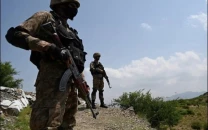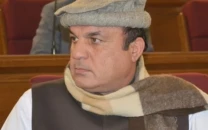Energy crisis: In the face of odds, more experts vouch for coal
Ask the incoming government to harmonise governance to curb the menace.

According to an expert 210b dollars is the amount the country would need in the next 20 years to meet the growing energy needs. PHOTO: FILE
There are no easy and quick solutions to the menace of loadshedding in country. This is because of grave dichotomy at the policy base; the planning commission has been overshadowed by the finance ministry and absence of continuity has deprived the concerned authority of institutional memory.
This was stated by Sir Syed CASE - Institute of Technology Vice Chancelllor Dr Shaukat Hameed Khan, while presenting Energy Vision 2030 on the concluding day of the conference on “Solutions for Energy Crisis” on Thursday.
On top of that, he added, fuel needed for energy generation as well as funds to pay the enormous circular debt were in short supply. He further said the energy system was not attuned to technology which determined the demand-supply equation. He observed that the Iran Pipeline (IP) would only partially meet the shortage. There are home-grown solutions available and coal above every other resource offered a natural option but planners had been neglecting these for over three decades now.

He further said that unless the incoming government harmonises its fragmented governance, it would be hard to curb power outages. He estimated the country would need $210 billion in the next 20 years to meet the growing energy needs. He favoured coal-based energy but since mining of Thar coal could take long Pakistan should import coal for immediate use in place of diesel and furnace oil.
Coal Water Slurry (CWS) Technologies Director Salman Qaisrani made a presentation on the topic, saying that the CWS Combustion Technology offered the cheapest, quickest and most workable solution in the short and medium term as it was based on local coal reserves of Thar. He added that the present thermal power units using expensive imported furnace oil could easily be converted to use this formulated material which would be reduced by one third the present cost of power.
The entire changeover could be accomplished in six months to one year, he said, adding it was not a new technology and was in use in Russia and China while India was using it through imported coal. The technology was offered to the previous government but it did not respond for its own reasons. Now the CWS technology was being offered to the private sector.

Private Power and Infrastructure Board Managing Director NA Zuberi, said the private sector was producing the bulk of the electricity (46 per cent) but shortage of fuel and funds was constraining generation growth. He said work was a pace on the feasibility of Mega Power Parks based on imported and local coal. If these parks materialised the country’s energy shortage would end.
Advocate Ameena Sohail, senior associate at Institue of Police Studies, spoke on impact of 18th amendment of the constitution on energy generation, calling it merely cursory as much remained to be done by the Council of Common Onterests that needed to be activated in this regard, particularly in respect of the Strategic Plan of 1992.
Barrister Aeman Maluka spoke on energy conservation efforts which she said only existed on paper as the policy of self regulation by industries was a failure in the absence of an overseeing mechanism. She said environmental taxes also could not be imposed in a country where tax theft was rampant.
Dr Nazir Hussain of QAU spoke on diplomacy and international dimension of energy management. The conference was organised by Islamabad Policy Research Institute and Hanns Seidel Foundation, Islamabad.
Published in The Express Tribune, May 17th, 2013.



















COMMENTS
Comments are moderated and generally will be posted if they are on-topic and not abusive.
For more information, please see our Comments FAQ